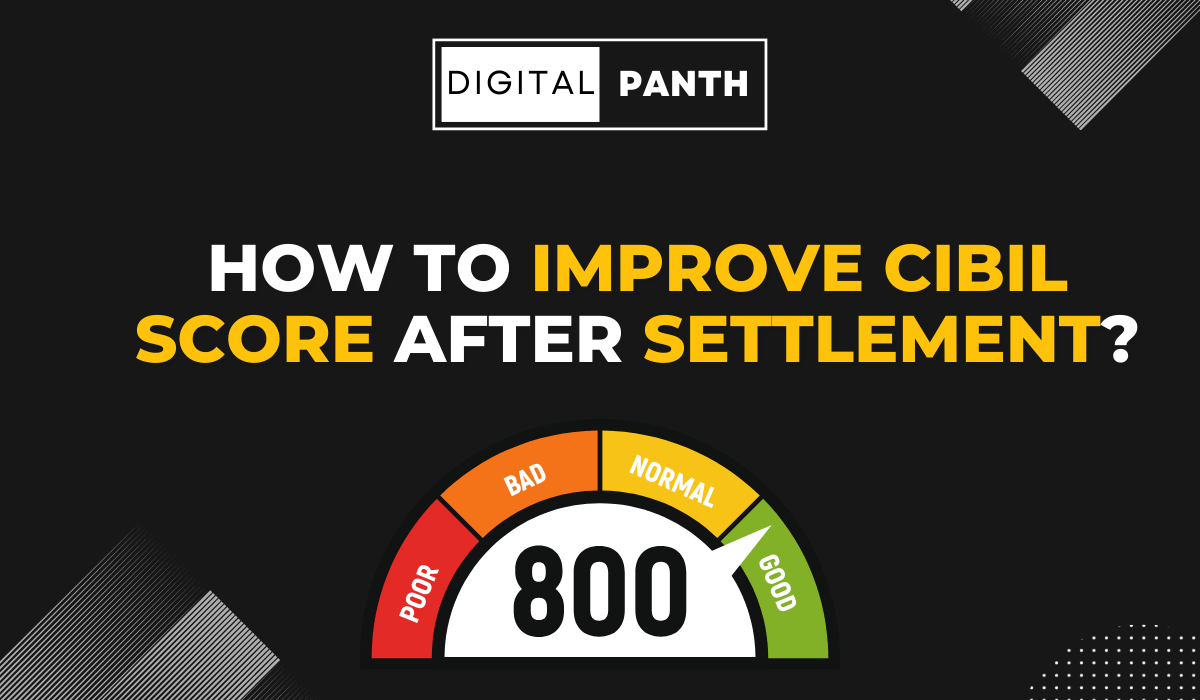How to Improve CIBIL Score After Settlement? When applying for credit cards or loans, lenders will consider your creditworthiness based on your three-digit Credit Information Bureau India Limited (CIBIL) score. Based on your financial habits, a three-digit CIBIL score might range from 300 to 900.
Read: How To Close RBL Credit Card Permanently?
Read: How to Increase CIBIL Score From 600 to 750?
The closer you reach a Cibil score of 900, the more likely your loan application will be approved. A CIBIL score of 750 or higher is regarded as good. Your CIBIL score always changes based on your financial behavior.
The Meaning of Loan Settlement
If borrowers truly struggle to make their loan payments, lenders or banks may offer them a one-time settlement of the loan. After six months have gone by without any dues being paid, the lender or the bank will present you with a selection. They will assess these and other similar variables, as well as ones like losing a job, getting into an accident, or developing a serious illness.
After meeting with the borrower and evaluating his situation and the sincerity of his complaint, the lender or bank representative decides whether to write off the difference between the amount paid and the amount due. The bank or lender then reports a loss and exempts the borrower from liability. Even though the borrower might see it as a sign of relief, this is actually going to spoil his CIBIL score, and next time he goes for any loan, he has to pay a high value for it.
Impact of Loan Settlement on CIBIL Score
However, the settlement of a loan account results in a loss to the lender, who writes off the amount that was waived off and records it as a loss. The Credit Bureau would receive a similar report.
Therefore, a loan settlement will reflect badly on your credit record. Your prospects of obtaining a fresh loan in the future are severely harmed by any poor history on your report, which endures for 7 years. Additionally, you can be put on the lender’s “do not deal with list” for any future banking or financial transactions.
As a result, before approving the lender’s offer, you should carefully define your terms. There are currently four credit rating companies operating in India: TransUnion CIBIL, Experian, CRIF High Mark, and Equifax.
How to Improve CIBIL Score After Settlement
If you, the borrower, are having problems repaying your loan because of circumstances like unemployment, an accident, or a severe medical condition, do not accept your lender’s or the bank’s first offer of the one-time settlement option. Remember that the settlement will affect your credit score. You could consider selling some of your possessions or a chunk of your portfolio as an alternative to paying off the loan. If you can’t do that, kindly get in touch with your loved ones and friends. You should stay away from any settlements.
If you have no other options, continue to use the settlement as a last resort. However, you might discuss acquiring a longer payback period, a shorter repayment term, or any combination of these with your lender or bank. Even if paying off the loan account would relieve your EMI woes, a low credit score will continue to follow you for a very long time.
You must now take strict responsibility for your financial status and take the necessary steps to raise your score. Let’s investigate ways to quickly raise your CIBIL score following a debt settlement:
- Try to limit the number of accounts you open. Opening many credit lines quickly can be interpreted as a sign that you are having trouble managing your finances, which could hurt your CIBIL score.
- Keep previous accounts open: The average age of your credit history can be decreased by closing older accounts, which may lower it and lower your CIBIL score.
- Limit the use of your credit cards: Your CIBIL score can be raised by maintaining a low credit utilisation rate (the percentage of available credit that is being used). Try to keep the balance in each account at or below 30% of the overall limit.
- Remain in touch with the lender: Be in touch with your lender if you can’t make a payment. Because non-payment of an instalment and being away from the lender can negatively affect your CIBIL score.
- Pay off every debt: Make sure you pay off the entire sum on any other accounts that may still be owed money, such as credit card or loan accounts. The CIBIL score suffers when credit card balances are high. You need to be careful not to let missed payments affect your credit score any longer.
- Create a solid history: Lenders would initially look at your credit report to see whether you qualify for a loan. As a result, you must make sure to create some positive history and erase the negative past that was mentioned in the report. From now on, make sure to pay off all of your credit card bills and EMIs before the deadline. Paying your monthly installments on time increases your score quickly.
- Control credit card use: There can be too many hands of cards. It does occasionally happen that a card that is sitting unused and not being used results in a missed payment for an annual fee and a black mark on your credit report. As a result, you must examine all previous cards and, if possible, close those that you don’t need anymore. Don’t forget to keep the oldest card with a nice history, though. Because it helps to increase future credit by having a long and positive history.
- Implement a secured credit card: Applying for a credit card is necessary if you don’t already have one. Your ability to use credit shouldn’t be hampered by a settled loan. To improve your credit score and prospects of getting a loan, use credit cards wisely. Make sure you pay the total balance on your card before the due date.
- The use of credit: A good credit score can be maintained by maintaining a favorable credit utilization ratio (CUR). Your CUR is a portion of the credit limit that has been applied to the total limit that has been allocated to you. You must not exceed 30% of your credit limit to keep a good credit rating. Constantly using too much credit damages your score and gives the impression that you are credit-hungry.
- Avoid requesting loans: You must make sure that after the settlement, none of your subsequent actions portray you as a loan-hungry applicant. After a settlement transaction has been completed, do not apply for or inquire about a new loan. A loan denial, after all, might further damage your credit rating. You must not seek out additional credit while you are restoring your credit score; instead, you must solely focus on that.
- Strive for good credit: In comparison to secured loans, unsecured loans are more challenging to obtain with a low credit score. In the event that you do want cash despite your problematic credit history, be sure to qualify for a secured loan and have a backup plan for repayment. For a low-interest loan, you can also think about bringing in a co-signer or guarantor.
Conclusion
Loan settlement is not viewed as a wise financial move, and it significantly lowers your credit score. Additionally, it discourages financial organizations from approving your loan application in the future. This may be overcome if you attempt to raise your credit score by foreclosing on other outstanding debts, using credit cards responsibly, and building a solid portfolio of secured and unsecured loans.
If not handled properly, loan settlements have a negative effect on your credit history and become a disadvantage. You must refrain from it as a borrower. If you have no choice but to enhance your record, do so. For a quick and no-cost credit score check, contact Tata Capital. Visit our website right away to quickly obtain your credit records.




Leave feedback about this